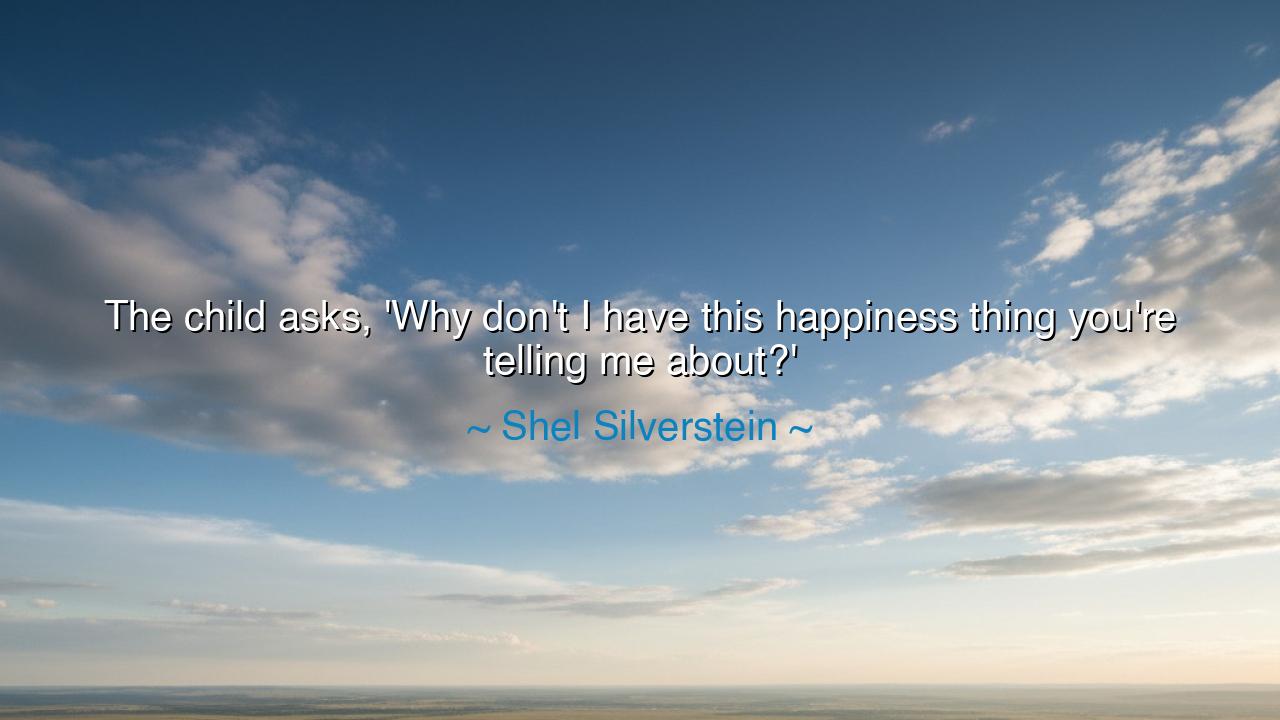
The child asks, 'Why don't I have this happiness thing you're






When Shel Silverstein wrote, “The child asks, ‘Why don’t I have this happiness thing you’re telling me about?’” he was not merely speaking of a child’s question, but of humanity’s eternal confusion—the gap between the promise of happiness and the experience of it. Beneath these simple words lies a profound lament, a mirror to our modern condition. The child, pure and unguarded, hears the adult world speak endlessly of joy, success, and fulfillment, yet looks around and feels emptiness. The question is innocent, but its echo is ancient: Where is this happiness you speak of? Why is it not within me?
Shel Silverstein, known for his whimsical poems and tender insights, was a man who wrote for children but spoke to the souls of all ages. His works—like The Giving Tree and Where the Sidewalk Ends—blend laughter with longing, simplicity with truth. In this quote, he captures a sacred paradox: that as we grow older, we speak more of happiness, yet understand it less. We teach children that they must chase it—through grades, through possessions, through approval—but the child, in his natural wisdom, cannot find it there. His question exposes the illusion that adults, in their striving, have forgotten how to live.
The child’s question is not one of greed or envy—it is one of wonder. He does not ask for more; he asks for meaning. He cannot understand why this thing called happiness, which should be as natural as breathing, feels so distant and conditional. The world tells him he must earn it, deserve it, or wait for it, when in truth, happiness is not a treasure to be found, but a state of being to be remembered. The child, in his honesty, holds a mirror to the grown soul and says: You have forgotten how to be what I already am.
In the ancient days, philosophers wrestled with this same question. Socrates, walking through the marketplace of Athens, said, “How many things I can do without.” He knew that happiness—what the Greeks called eudaimonia—did not dwell in wealth or pleasure, but in harmony with one’s own spirit. Buddha, too, sat beneath the Bodhi tree and discovered that desire is the root of suffering—that the more we chase joy, the more it slips away. The child’s question, in Silverstein’s hands, is the same question these sages faced: why do we seek in the world what was once within us?
Consider the story of Helen Keller, who was deaf and blind from infancy. By the world’s measure, she should have been denied joy. Yet through the guidance of her teacher, Anne Sullivan, she awakened to the beauty of existence—not through sight or sound, but through touch, learning, and love. “I am happy,” she once said, “simply because I am alive.” Her life is proof that happiness does not depend on circumstance. It is not found in abundance, but in awareness. Helen Keller, who could not see the sun, carried its light within her soul.
Silverstein’s wisdom reminds us that somewhere between childhood and adulthood, we lose this awareness. We trade wonder for worry, presence for pursuit. The world tells us that happiness lies in the future—after success, after wealth, after approval—yet the child’s question cuts through this illusion. The child lives in the moment; he laughs freely, forgives easily, and marvels without shame. He knows happiness, until he is taught to question it. Silverstein, with his quiet genius, reminds us that the real tragedy is not that happiness is hard to find, but that we have forgotten how to feel it.
So, my children of heart and spirit, let this teaching take root within you: stop chasing happiness as though it were a prize to be won. Return instead to the simple gratitude and curiosity of the child. Ask not “Why am I not happy?” but “What have I lost that once made me so?” Look again at the sky, taste the air, speak kindly, and create without fear of failure. For happiness, as Silverstein knew, is not a destination—it is the pure note that rings when the heart is free from demand.
Therefore, live as the child lives: awake, present, unburdened by comparison. Let joy arise not from achievement, but from being alive. For the child’s question is not a complaint—it is a reminder, whispered from innocence to wisdom: that happiness has never left us. We have only forgotten how to see it. And once we remember, we will discover that the treasure we sought was within us all along, shining quietly, waiting for us to notice.






AAdministratorAdministrator
Welcome, honored guests. Please leave a comment, we will respond soon